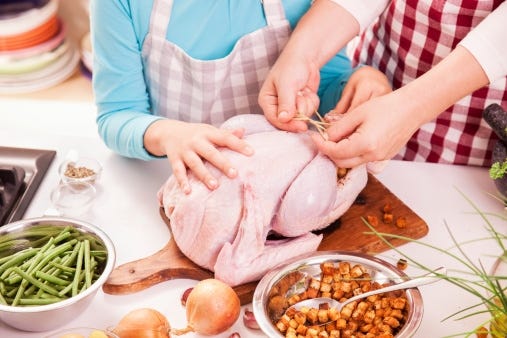![Once you’ve removed the turkey from the refrigerator, avoid leaving it on the counter, because bacteria will form on the warmer surfaces. [Special to the News Bulletin]](http://127.0.0.1/wordpress/wp-content/uploads/2022/01/ghows-DA-5e6bc364-27f4-73e1-e053-0100007f9bec-f60c051d.jpeg)
’Tis the season for holiday feasts, so before and after you enjoy a nutritious, tasty cornucopia, be sure to clean and cook thoroughly, University of Florida’s Institute of Food and Agricultural Sciences experts say.
Here are hints to avoid food-borne illnesses from a holiday meal, according to Samara Deary, a family and consumer sciences agent with UF-IFAS Extension Bradford County; Nan Jensen, family and consumer sciences agent with UF-IFAS Extension Pinellas County; and Amy Simmone, UF-IFAS professor of food safety and food science in the department of family, youth and community sciences:
Wash your hands.
Wash your hands before, during and after preparing holiday feasts — that 20-second step will do more than anything to help prevent the spread of food-borne illnesses.
"When preparing a meal, if you do not use safe practices in the beginning, it increases the chances of illness greatly," Deary said.
In addition, clean your utensils before you cook, and while you’re preparing your meal, don’t eat any raw dough.
"This is the time of year for making sweet treats and desserts," Jensen said. "Many of those goodies are made with flour or eggs and can contain harmful germs such as E. coli and Salmonella. While you may be tempted to ‘take a taste’ of the raw dough or batter, the advice is wait and enjoy them after they have been baked so you don’t risk getting sick."
Thaw the turkey.
The best method is to thaw in the refrigerator a few days before preparation. It takes about 24 hours in the refrigerator for every 4 to 5 pounds of turkey to thaw properly. If you forget to remove the turkey from the freezer, you can thaw the bird in cold water that you change every 30 minutes.
Once you’ve removed the turkey from the refrigerator, avoid leaving it on the counter, because bacteria will form on the warmer surfaces.
The safe internal temperature for turkey and other poultry is 165 degrees. Cook stuffing and turkey separately. Also, keep foods you won’t cook separate from items that can contaminate other foods, such as raw eggs, meat, poultry or seafood. Then, cook your food to the proper temperature.
After the meal, a lot of us want turkey sandwiches and other leftovers. Refrigerate leftovers at 40 degrees or colder as soon as possible or within two hours. Eat stuffing and gravy within one to two days. Turkey will last for up to four days.
For longer storage, pack in freezer bags or airtight containers.
This article originally appeared on Crestview News Bulletin: UF-IFAS experts: Clean and cook holiday meals thoroughly
